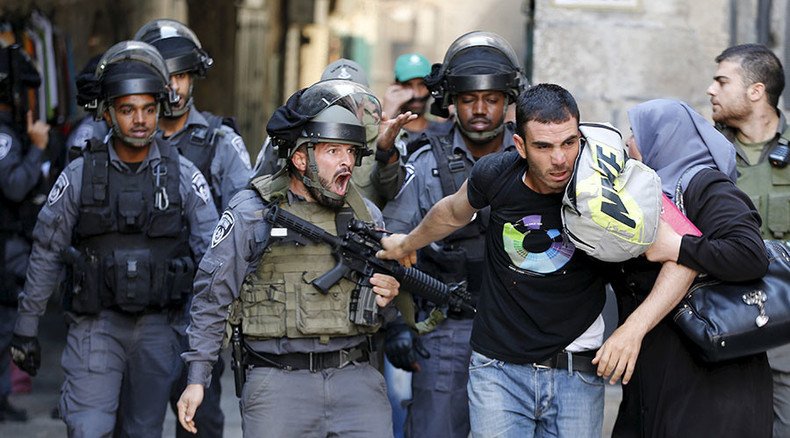Israeli police block Temple Mount CCTV installation

Israeli police have blocked the installation of cameras on Temple Mount. The cameras were supposed to have been introduced in order to reduce Israeli-Palestinian tensions. Police said the operation must be coordinated and approved at a “diplomatic level”.
The introduction of CCTV cameras over the holy site was agreed upon this past weekend between the Israeli, Jordanian and Palestinian sides, in order to reduce tensions that have been on the rise over the last weeks.
However on Monday, Waqf, the Muslim authority which administers the Temple Mount under an agreement dating back to the end of the Six-Day War of 1967, said that Israeli police interfered with the surveillance cameras’ installation process.
“They told our crews to stop the installation work and ordered us to remove everything we already had installed,” Azzam Khatib, director of Waq, told Al Jazeera.
“We severely condemn the Israeli interference into the working affairs of the Waqf, and we consider the matter evidence that Israel wants to install cameras that only serve its own interests, not cameras that show truth and justice,” Waqf said in a statement.
According to the established status quo, Muslims can pray at the holy site, but Jews are only allowed in as visitors. According to local Israeli media outlets, Israeli officials have continued to insist that there will be no change to the status quo at the site, including installation of CCTV, without the agreement of all sides.
“It wasn’t coordinated with us,” police spokesman Micky Rosenfeld said, according to Wall Street Journal. “You can’t just put up cameras.”
The Israeli police spokesperson, Luba Samri, told The Times of Israel that “the issue is still being discussed at a diplomatic level. Once a decision is made it will be implemented with the approval and coordination of all relevant parties.”
US Secretary of State John Kerry announced over the weekend that a deal between Israel and Jordan, which administers the site, to install the security cameras had been established. Netanyahu’s office gave a statement of its own on Monday.
Israel has already expressed consent to start process of Installation of cameras on Temple Mount as soon as possible pic.twitter.com/pKpIxBeFzP
— Israel Foreign Min. (@IsraelMFA) October 26, 2015“Final arrangements for the manner and location of the cameras on the Temple Mount, which was agreed upon between Israel, Jordan and the United States, were intended to be coordinated by the professional elements,” a statement from the Netanyahu's office said on Monday.
Now Jordanian and Israeli technical teams are scheduled to meet before the cameras are introduced on Holy Mount. “The cameras will be installed according to the outcome of the agreements which will be determined by the sides. Israel already expressed its agreement to beginning the process as soon as possible,” the PM’s office added.
Statement by the Prime Minister's Office: The Installation of Cameras on the Temple Mount. pic.twitter.com/nDh8ACu1YH
— Ofir Gendelman (@ofirgendelman) October 26, 2015In a separate twist in the ongoing fluctuations in Israeli-Palestinian tensions, an Israeli government official told Reuters that Netanyahu’s team is contemplating the revocation of some East Jerusalem-based Palestinians’ benefits and travel rights.
The possible move, which has been criticized by observers, comes as protests against Israel’s ongoing occupation of the West Bank, including East Jerusalem, and the Gaza Strip have increased in frequency. Israel continues to use lethal force against Palestinian protesters who are calling for unrestricted access to worship at Al-Aqsa and demand an end to Israel’s military occupation of the Palestinian territories.
School days become increasingly perilous as violence rages in Hebron https://t.co/KBHeBwId9zpic.twitter.com/y8m0lCD0cj
— ISM Palestine (@ISMPalestine) October 26, 2015“This alarming escalation, an inhuman and illegal measure, must be stopped immediately,” Hanan Ashrawi, a member of the executive committee of the Palestine Liberation Organization, said in a statement.
Most Palestinians who live in occupied East Jerusalem do not have Israeli or Palestinian Authority citizenship and instead carry an Israeli-issued residency permit. The move could strip the Palestinians of their Jerusalem residency rights and social security.
Initial Report: Terrorist shot and killed during stabbing attack at Cave of Patriarchs
- https://t.co/xi1VhVoIrM from Jpost
— reuben poupko (@poupko) October 26, 2015Rumors of the potential revocation of rights sparked new unrest in the West Bank on Monday, with a 22-year-old Palestinian falling victim to Israeli forces after he reportedly stabbed an Israeli just outside the city of Hebron. Following the incident Palestinian protesters and Israeli forces clashed at the scene.
Initial report: IDF forces thwarted stabbing attack on IDF soldier in Hebron. Responding to imminent danger, forces shot assailant on site.
— IDF (@IDFSpokesperson) October 26, 2015In another incident in Hebron, Israeli forces shot and killed a 19-year-old, outside the Cave of Patriarchs, known to Muslims as Ibrahimi Mosque, after he too allegedly tried to stab a soldier.
The recent increase in tensions started in early October after Israel imposed restrictions on worshipers at Al-Aqsa mosque in Jerusalem. So far this month, at least 56 Palestinians have been killed during protests, while at least 10 Israelis have lost their lives in stabbings or shootings.
LISTEN MORE:












